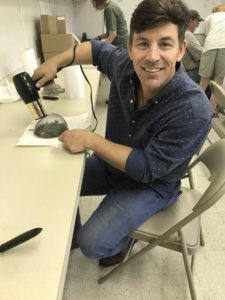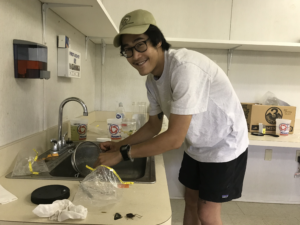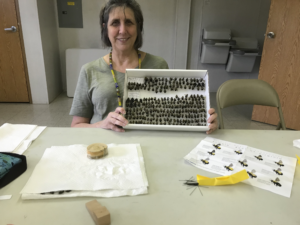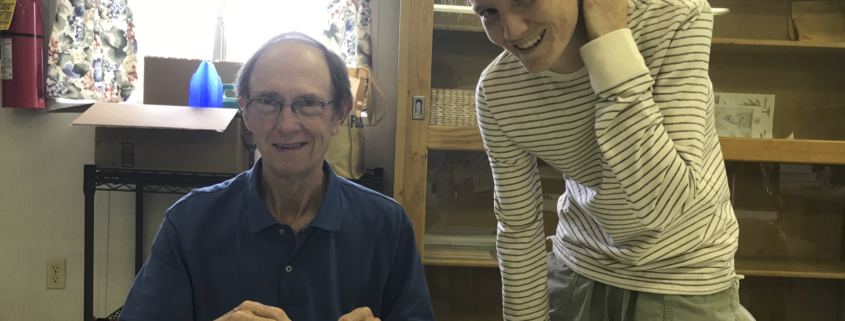Become a Citizen Scientist with the Smithsonian Conservation Biology Institute
Are you ready for a chance to visit some of the most gorgeous wild places in Northern Virginia–places you’d never find on your own?
Would you like an opportunity to apply your naturalist skills to ground-breaking scientific research (and get credit for service hours)?
Does cost-free training in survey and preparation protocols for specific guilds (birds, plants, pollinators) appeal to you? And admission to citizen science workshops that are interesting, informative, and fun?
Are you looking for opportunities to network and make friends with others who have similar interests?
Consider working with the Smithsonian Conservation Biology Institute (SCBI). Every spring, Virginia Working Landscapes (VWL), an SCBI partner, recruits citizen scientists to assist with plant, bird, mammal, and pollinator surveys across the Piedmont of northern Virginia. These surveys are part of an ongoing study of working grasslands that examines species diversity under various management regimes and at different stages of warm season grass establishment. Fairfax Master Naturalists receive service credit (C200).

You do not need to be an expert to participate in the surveys (although both the plant and bird surveys demand a working knowledge of local flora and birds). All you need is an interest in learning and sufficient time to dedicate to the project. Each survey features a mandatory introductory meeting to cover important information such as survey protocols, identification skills, and site assignments.
Yup, there are a few low-stress requirements, given that SCBI is part of the federal government. All VWL volunteers are required to register as a volunteer with Friends of the National Zoo. FONZ manages one of the largest single-unit volunteer forces in the Smithsonian Institution, which supports nearly every function of daily life at the Zoo and beyond. FONZ requires participants to be be a minimum of 18 years old, submit a Registration Application on the FONZ website, and (when selected) pass a Smithsonian background check.
If you are interested in volunteering as a citizen scientist for VWL surveys, please contact: [email protected].
POLLINATOR SURVEYS

Training includes information on pollinator life history, survey collection protocols in the field, identification of the most common bees and butterflies and specimen preparation for taxonomic identification. Citizen scientists are expected to process and store specimens properly, fill in survey sheets, and deliver or coordinate delivery of samples to the pollinator survey coordinator. The final identification of specimens will be completed by para-taxonomists.
- You’ll perform surveys in late May-June and August.
- Each survey takes about 4 hours per site, plus the additional time it takes to sort and identify the bees.
- Survey dates can be at your convenience within the specified sampling periods (Spring = June, Summer = August).
- Must be able to commit to 30-40 hrs.
- Survey training, supplies and equipment provided.
BIRD SURVEYS
Introductory training includes a brief overview of project goals, survey protocols, data collection and site assignments. A practice survey session for new volunteers is then held one month later and focuses on counting techniques. Knowledge of local bird species is essential.
- Survey season runs May 15-June 30.
- Counts are carried out within 3 hours of sunrise and take approximately 45-60 minutes per site (three 10-minute counts).
- Time commitment is a minimum of 6 survey sessions plus training (estimated 15 hrs not including travel).
- You will need personal binoculars and a field guide; all other survey supplies provided
PLANT SURVEYS
Training includes protocols, identification skills, and specimen preparation. There is no need to be an expert in Virginia’s native flora, but VWL does ask that you have familiarity with Virginia flora, and the ability to key out unknown specimens with a dichotomous key and the VWL reference collection. It is possible to pair with a more experienced person.
- Surveys are performed in June and again from the last week of July through August.
- Each site takes approximately 6-8 hours to survey.
- Must be able to commit at least 5 days (an estimated 30-40 hrs plus travel), but the scheduling of the survey days is flexible.
- Supplies and equipment provided.
MAMMAL SURVEYS
This survey uses camera-traps and our custom eMammal software to determine the occurrence of a wide range of mammals. Volunteers will use a GPS device to navigate to predetermined locations and setup cameras. Cameras will be left to survey for 3 weeks at a time without scent or food lure. Every 3 weeks they will retrieve the camera, replace memory card and batteries, and place camera in new location (estimated 1 hour per camera). Volunteers will then upload photographs and metadata using eMammal software (approximately 1 hour per survey period), where it will be reviewed by project staff.
- Surveys are performed May through November.
- Each site takes approximately 2 hours per survey period.
- Participants will need a personal GPS device, all other survey supplies provided.
WHAT VWL and SCBI WILL NEED FROM YOU
- Fill out the form (click here) to join the volunteer applicant email list.
- Participate in introductory training sessions and sampling days.
- Join the FONZ network, and undergo fingerprinting and background check.
- Complete assigned field surveys within the allotted time period.
- Reply to emails concerning logistics and data management.

If you are interested in volunteering as a citizen scientist for VWL surveys, please contact: [email protected].




